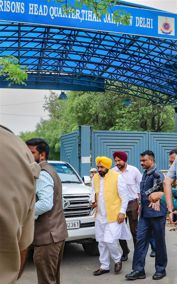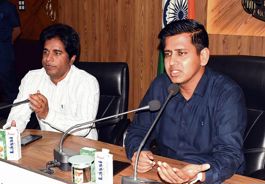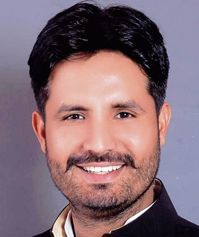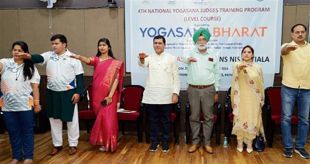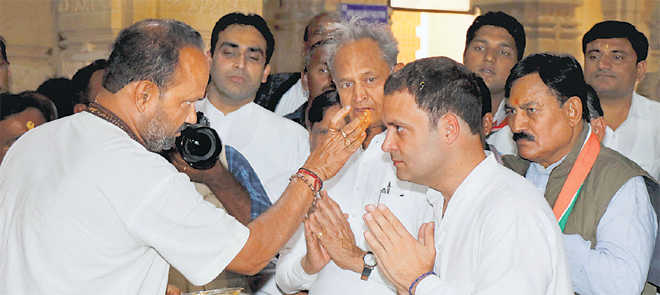
Congress Vice-President Rahul Gandhi at the Somnath temple in Gujarat on Wednesday. PTI
Satya Narayana Sahu
Former Press Secretary to President KR Narayanan
Rahul Gandhi's visit to the Somnath temple on Wednesday and the alleged entry of his name in the register meant for non-Hindus has predictably caused a row. It came to imply that he is not a Hindu. Photographs of him wearing a sacred thread were flashed to prove his credibility as a Hindu. Efforts were made to demonstrate that his religion is Hinduism and the entry of his name in the register meant for non-Hindus is a political mischief. It is strange that the immediate identity of somebody gets highlighted just to score a political point and appeal to voters.
Let us take two examples from history where our leaders refused to be defined by their religious identity alone:
1. In 1965, just before the invasion of Pakistan on India, the BBC in a radio broadcast stated that the Prime Minister of India Shri Lal Bahadur Shastri being a Hindu would attack Pakistan which is a Islamic Republic. Immediately, Prime Minister Shastri issued a statement in which he dismissed the BBC portrayal of his identity as PM of India in terms of Hindu religion as mischievous and asserted that he became the Prime Minister of India not because of Hinduism but because people of all faiths chose him for the post. He then referred to the secular character of India and the office of the Prime Minister. He argued that India did not stand for only one religion and he being the Prime Minister, and not a Hindu, would defend India the idea of which could not be reduced to one religion. It is a remarkable lesson which teaches us to stand above religion.
2. Another shining example of going beyond religious identity was shown by none other than Mahatma Gandhi when he declined to meet Jinnah who insisted that he should come to see him as a representative of the Hindus. Gandhiji wrote a piece on the issue and he defined his identity beyond Hinduism. He said that he hailed from Gujarat and, therefore, he had a Gujarati identity which was coextensive with his Indian identity. Then he further expanded his Gujarati and Indian identity by saying that these Gujarati and Indian identities coexisted with his planetary identity. Stretching further and broadening all those identities, Mahatma Gandhi said that he was of the cosmos and so his Gujarati, Indian and planetary identities coexisted with his cosmic identity.
These refreshing examples of leadership teach us to go beyond immediate identity by including manifold identities which define every individual.
Professor Amartya Sen, in his book Identity and Violence, and in one of his speeches "Indian Identity" had cautioned that if one identity of an individual is privileged over other identities, it would lead to distortion and imbalance of multiple identities which an individual has and which define his overall identity. Such a process of privileging one identity over other identities would necessarily lead to narrowness of mind which, in turn, would spread violence and venom, cashing festering sores across the whole body polity.
Glorious legacy
Politics, which is a necessary attribute of parliamentary democracy, has to be used to nourish and enrich the unity of our country. By remaining wedded to the multiple identities which we have and by remaining tuned to the Constitution and not to any shrine or place of worship, we can defend the Idea of India.
Rahul’s visit to Somnath temple or the visit of anybody to any shrine should be seen from the perspective of the Mahatma who juxtaposed his Hindu identity with his planetary and cosmic identities. Such a harmonious approach is indispensable to harmonise our identities to use politics to foster harmony and understanding in society and stand up for the Idea of India.
The Mahatma said he did not want India to be wholly Hindu, wholly Islamic or wholly Christian but wholly tolerant with all its religions coexisting side by side and flourishing. He also said that to define nationalism as Hindu nationalism or Islamic nationalism is a libel on nationalism.
Exactly the same composite dimension of nationalism was given by Swami Vivekananda when he said that he wanted India to have a Vedantic brain and Islamic body. Dr BR Ambedkar described attempts to establish the Hindu Rashtra as "arrant non-sense". In no phase of India's history was the identity of India defined by the religious identity of the rulers. When Sardar Patel wanted to use government funds to reconstruct the Somnath temple, Mahatma Gandhi advised to create a trust and appeal the people to contribute money for that purpose. Sardar Patel paid heed to this voice of sanity and desisted from using the funds of the Government for conducting religious work. In doing so, Sardar Patel was setting a splendid example of keeping the State apparatus away from religion and temple construction activities. It is gratifying to note that that narrative of Gandhi's advice to Sardar Patel and the later's acceptance of it is part of the light and sound show event being conducted every evening in the sacred premises of the temple for the pilgrims who visit the shrine.
Such a glorious legacy to go beyond religious identity in public life and politics and not to use the State for religious purposes is the defining feature of our Republic. It is every Indian’s duty to uphold this legacy which is the basic structure of the Constitution. The leadership must remain tuned to this legacy to uphold the Idea of India or in the words of the former President of India, the late KR Narayanan, the ideals of Indiatva in contrast to Hindutva.
Mahatma Gandhi’s example
In the pre-independent India, once when Mahatma Gandhi was requested to dedicate the Lakshmi Narayan temple in Delhi, which is popularly known as the Birla temple, he initially refused to do so. However, he was persuaded to come and do the honours as Pandit Madan Mohan Malviya who was supposed to do it could not come to Delhi because of his other engagements. Gandhiji, while doing so, delivered a speech and said that by visiting a temple, a devotee should pray to get strength to respect faiths of others and fight against the practice of untouchability which plagued Hinduism.
(Views are personal)
























